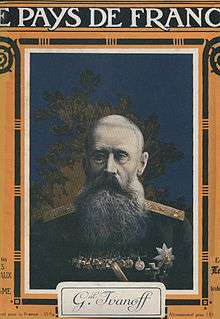Nikolay Iudovich Ivanov
| Nikolay Iudovich Ivanov | |
|---|---|
.jpg) General Ivanov | |
| Born |
3 August 1851 Mosalsk, Russian Empire |
| Died |
21 January 1919 (aged 67) Novocherkassk or Odessa |
| Allegiance |
|
| Service/branch | Imperial Russian Army |
| Years of service | 1869–1919 |
| Rank | General of the Artillery |
| Battles/wars |
Russo-Turkish War (1877-1878) Russo-Japanese War World War I Russian Civil War |
| Awards | see below |
Nikolay Iudovich Ivanov (Russian: Никола́й Иу́дович Ивано́в; 3 August 1851 – 27 January 1919) was a general in the Imperial Russian Army during World War I.
Biography
Ivanov came from a military family. He graduated from the Mikhailovsky Artillery School in 1869, and served in the 3rd Grenadier Guards and artillery brigades. His first combat experience came during the Russo-Turkish War (1877-1878), and he subsequently remained in Romania to serve as an instructor to the Romanian Army. From 28 July 1884 he was commander of the 2nd Battery of the Imperial Guards Artillery, and on 11 April 1890 was appointed commandant of the fortress artillery of Kronstadt. On 14 December 1899 he was selected to be an aide-de-camp to Grand Duke Michael. He participated in the suppression of the Boxer Rebellion in China in 1900.
Before the start of the Russo-Japanese War, Ivanov was promoted to lieutenant general. Following the death of Lieutenant General Fyodor Keller in August 1904, he succeeded him as commander of 3rd Siberian Corps. He participated in the Battle of Liaoyang and the Battle of Mukden, and despite his lack of distinction,[1] he was awarded the prestigious Order of St. George (4th class and 3rd class with golden arms, decorated with diamonds). After the end of the war, he was briefly Chief of Logistics of the Russian Manchurian Army, overseeing its withdrawal back to Russia. From 19 December 1905 to 6 November 1907 he commanded an Army Corps within the St. Petersburg Military District, further assuming the role of interim governor-general of Kronstadt from 6 November 1907. The fortress city was a hotbed of revolutionary activity following the Russian Revolution of 1905, and Ivanov took decisive action to curb unrest in his military units. He was promoted to Adjutant General in 1907, General of Artillery from 13 April 1908, and Commander of the Kiev Military District from 2 December 1908, a post which he held until the start of World War I in 1914.
With the start of World War I, Ivanov was given command of the Imperial Russian Army on the Southwestern Front, responsible for much of the action in Galicia. Ivanov was able to hand the Austrians a defeat at the Battle of Galicia in August 1914 and a month later had repelled Austro-Hungarian forces 100 miles back to the Carpathian Mountains, surrounded Przemyśl, and inflicted 300,000 casualties. For these successes he was awarded the Order of St. George (2nd class) and the Order of St. Vladimir (1st class with Swords).

However, in 1916 Ivanov was sacked by the Russian High Command and replaced with Alexei Brusilov, arguably the best Russian commander during the war, who planned and coordinated the Brusilov Offensive. Ivanov was promoted to the Council of State, and due to his high political standing and reputation, he became a military advisor to Tsar Nicholas II in the Stavka, but his plans and suggestions were completely overshadowed by Mikhail Alekseev. When, in 1916, the Russian forces collapsed and the October Revolution ensued, Ivanov's military career with a united Russia came to an end. On 27 February 1917, he became commander of the Petrograd Military District with powers of martial law granted by the Tsar to suppress revolutionary activity. However, on arrival in Petrograd on 2 March, he found the city and its military units to be already under the control of the Russian Provisional Government. Unable to complete his orders, he returned to Moscow, and from there to Kiev, where he was arrested by the local Soviet, and returned to Petrograd as a prisoner. He was released on bail by Alexander Kerensky and quickly fled the city for Novocherkassk, where he joined the White movement.
An ardent royalist, Ivanov formed an anti-Bolshevik Cossack army, but was defeated in the Russian Civil War near the village of Vyoshenskaya, after which the remnants of his army joined in the Don Cossacks. Ivanov died of typhus in January 1919.
Honors
 Order of St. George, 4th class
Order of St. George, 4th class Order of St. George, 3rd class
Order of St. George, 3rd class Order of St. George, 2nd class
Order of St. George, 2nd class.png) Order of St Vladimir, 1st class
Order of St Vladimir, 1st classOrder of St. Stanislaus 1st degree
-
Order of St. Anne 1st degree
 , Order of St. Alexander Nevsky
, Order of St. Alexander Nevsky Order of the White Eagle
Order of the White Eagle- Gold Sword for Bravery
References
- Kowner, Rotem (2006). Historical Dictionary of the Russo-Japanese War. ISBN 0-8108-4927-5: The Scarecrow Press.
- Out of My Past: The Memoirs of Count Kokovtsov Edited by H.H. Fisher and translated by Laura Matveev; Stanford University Press, 1935.
External links
| Wikimedia Commons has media related to Nikolai Ivanov. |
- First World War.com — Who's Who — Nikolai Ivanov
- MSN Encarta — World War I — Operations in Galicia (Archived 2009-11-01)
Notes
- ↑ Kowner, Historical Dictionary of the Russo-Japanese War, p. 165.